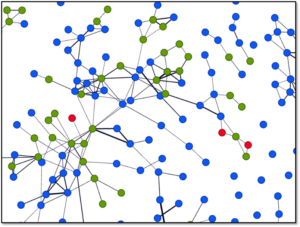by Hernan Mondani and Amir Rostami and Jerzy Sarnecki
In this study, we use Swedish register data and social network analysis to uncover the role region of birth has for the choice of co-offenders in the period 1995-2015.
The study of criminal organizing and criminal collaboration is considerably difficult. Criminals are actively trying to avoid being discovered, and knowledge about their activities and the way they organize themselves is bound to be partial and dependent on various factors such as the degree to which individuals are discovered and the types of measures taken by law enforcement. Therefore, a full examination of these partially hidden phenomena would require information on individuals and their relationships over time, a task of daunting complexity.

To focus on one specific aspect of criminal collaboration, we zoom in on one pattern that has been observed in criminal collaboration, namely, that individuals tend to commit crimes with other individuals of similar characteristics. In particular, we are interested in finding out if individuals from a given region of birth tend to commit crimes with other individuals from the same region of birth.

To approach this task, we use Swedish population data and the lens of social network analysis. The idea is to use suspicion as an approximation for the degree of criminal collaboration, and to represent the suspicion relationships as a network. To that end, we construct a co-offending network, where the nodes are individuals and the links between the nodes connect individuals who have been suspected of one or more crimes together (see the picture below for an illustration of what the network can look like). The advantage of representing this problem as a network is that the focus is explicitly given to the structure of the suspicion relationships, and how this structure changes over time.

In our analyses, we use Swedish suspicion data from the population register of suspected individuals between 1995 and 2015. Our study population consists of individuals who have been suspected of committing one or more crimes together with at least one other individual. In particular, we investigate the role of region of birth in the development of these criminal networks. Our results so far show that co-suspicion links in the network do indeed occur for the most part between individuals belonging to the same region of birth. This is the case for the whole period 1995 to 2015. Furthermore, having the network structure, we ask the question of whether this tendency to commit crimes with others coming from the same region of birth can be due to chance. We then randomly rewire the networks and repeat the calculations, and what we find is that the observed pattern exceeds what we could expect by chance.

At the same time, it is important to keep in mind that region of birth is but one factor that influences choice of co-offender. A significant factor we are not considering is residential segregation, which can lead to immigrants being clustered with other immigrants. Further research should also look at how these patterns change by sex, age group, type of crime and region in the country, and how all these dimensions evolve over time.
Hernan Mondani is an associate professor in sociology, researcher at Stockholm University and the Institute for Futures Studies, and guest lecturer at the University of Gävle. His research is mainly concerned with social network models of organizing processes applied to criminal collaboration, and with neighborhood segregation in Sweden.
Contact: hernan.mondani@iffs.se
Amir Rostami is senior lecturer and associate professor in criminology at the University of Gävle. Hi is also researcher at the Institute for Futures Studies and Visiting Fellow at Rutgers University, Miller Center for community protection and resilience. He holds the rank of Police Superintendent at the Swedish Police.
Contact: amir.rostami@iffs.se
Jerzy Sarnecki is professor emeritus of general criminology at Stockholm University, senior professor at the University of Gävle and Mid Sweden University and researcher at the Institute for Futures Studies. He studies life-cycle criminology and criminal networks. He is co-chair of the jury of the Stockholm Prize in Criminology.
Contact: jerzy.sarnecki@iffs.se
